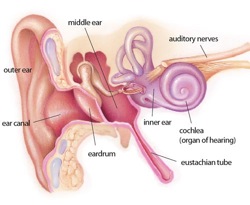Symptoms
You may have hearing loss without realizing it. Or you may have symptoms such as
- Earache
- A feeling of fullness or fluid in the ear
- Ringing in your ears (called tinnitus)
Causes
- Aging
- Ear infections, if not treated
- Certain medicines
- Genetic disorders
- A severe blow to the head
- Loud noise
Assistive Devices
- Hearing Aids—Small electronic devices worn in or behind the ear to help people hear more in both noisy and quiet situations. Hearing aids enable people with hearing loss to listen, communicate, and participate more fully in daily life.
- Cochlear implants—Small, complex electronic devices that can help to provide a sense of sound to people who are profoundly deaf or severely hard-of-hearing. They consist of an external portion that sits behind the ear and a second portion that is surgically placed under the skin.
- Assisted Listening Devices (ALD)—Devices that enable better communicating in day-to-day situations. ALDs can be used with or without hearing aids to overcome distance, background noise, or poor room acoustics. An example is a telephone amplifying device.
To Find Out More
For more information on hearing loss,
visit
www.medlineplus.gov, www.nidcd.nih.gov.
Prevention
- Know how much noise is too much
Sounds at or above 85 decibels (dB) can damage your ears. Normal conversation is about 60 dB. Chainsaws, hammers, drills, and bulldozers ring in at over 100 dB. - Protect your hearing from loud noise
Wear ear plugs or special earmuffs to prevent hearing loss from dangerously high noise levels. (See page 16 for more on decibel information.)

